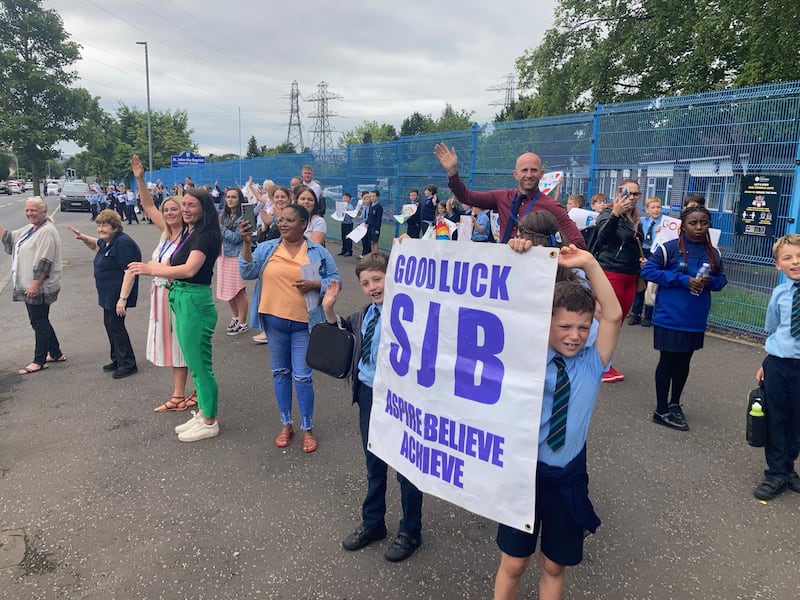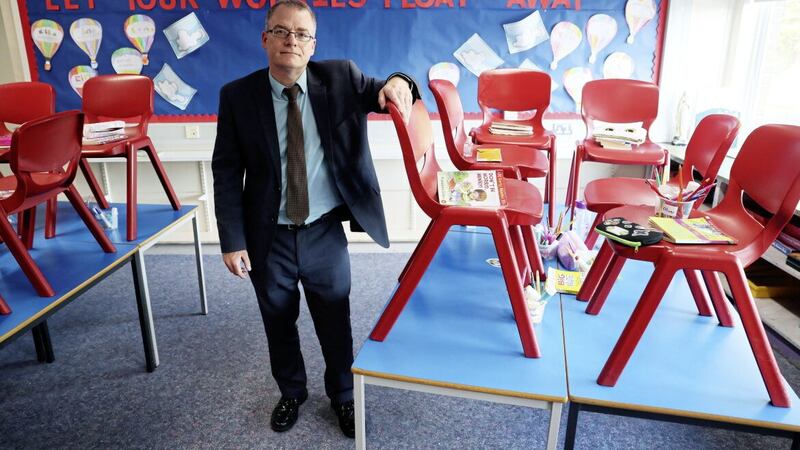It is a long-standing tradition in primary schools to afford the departing Primary 7 children the final gift of an extra few days off for their summer holidays.
The Leavers’ Day events immediately preceding the last farewell for the big P7 kids bring together staff, parents and children for occasions tinged with both joy and sadness as a seven-year odyssey comes to an end.
Since the darkest period of the Covid pandemic saw our schools being closed for periods of months, my own school has introduced a new tradition on this annual date, which sees the departing children and their parents drive in cavalcade past the front of the school after the culmination of the leavers’ ceremony to allow the children, teachers, classroom assistants and other staff to wave goodbye one last time amidst the fanfare of car horns.
A few days later, the PE hall is filled once again, this time with the parents of the incoming Primary 1 children who will enter the school in a few short months to begin their own educational journey.
Such is the circle of life in a primary school.

A couple of times each year, I have the privilege of meeting up with Marie, a now retired, one-time teaching colleague who was my year band partner and mentor for several years during the early days of my time in the vocation.
The passage of time dims the memory, so our gatherings provide an opportunity to recall, amidst much laughter, many experiences and moments from 20-odd years ago, catching up on how life has treated both former colleagues and the many students who passed through our classrooms.
Read more:
Chris Donnelly: Selective outrage and the complexities of remembrance
Chris Donnelly: Unionists' entitlement mindset needs dismantled
It truly is an honour to spend a lifetime in the company of children and adults committed to the vocation of education, though sometimes the brightness can be clouded by events and circumstance.
Last Wednesday, BBC’s Good Morning Ulster programme was part broadcast from St Paul’s Primary School in the Beechmount area of west Belfast.
The typically measured demeanour of the principal, Sean McNamee, did not diminish the power of his words in portraying the sense of growing despair amongst school leaders and staff about how the tsunami of cuts that continue to detrimentally impact upon schools are taking their toll on children, their parents and school staff.
Sean has served as chair for many years of a group bringing together west Belfast primary school principals, and his vision, sense of duty and desire to share best practice and support his colleagues has been a great source of comfort to many, myself included.
There are few people with the same passion and boundless energy working to support schools in disadvantaged communities as Angie Mervyn, the Education Programmes Manager at the West Belfast Partnership Board.
In her contribution to the same BBC programme, Angie correctly called out the DUP for their continuing boycott of Stormont and the British Secretary of State over his punitive budget, stating that Chris Heaton-Harris should “hang his head in shame” because of the cavalier manner in which he has wielded the axe to slash the education budget.
The trademark passion and zeal with which Angie approaches her job of working to support children in areas of greatest need came through in the frustration apparent when she noted how the cuts “target the kids who are most in need, most vulnerable and from areas of most deprivation”.
The list of cuts is simply devastating.
Holiday hunger payments. Counselling services. Reductions in special needs and extended schools funding. Cancellation of the Engage programme. And then there are the almost vindictive cuts, abolishing the programme that donated books to young children and the cycling proficiency initiative in schools.
The pincer movement effect of removing funding initiatives devised to support disadvantaged children, whilst simultaneously increasing the demand upon school leaders and teachers to plug administrative gaps being left from the retreat from such duties of the education bureaucracy, is creating a crisis.
There is an urgent need to push back against the trend of the education bureaucracy seeking to off-load administrative duties to those on the frontline in schools.
As strange as it may sound, schools need a champion who will articulate the case for protecting their ability to deliver quality teaching and learning experiences – whilst also providing essential pastoral care provision – without being needlessly shackled by bureaucratic duties and responsibilities.
Most disturbingly, the administrative responsibilities and obligations associated with our most vulnerable children, including those with special needs and looked-after children, continues to grow exponentially at the same time as schools’ capacity to dedicate personnel, time and resources to meet those needs is being severely curtailed due to budgetary constraints.
Too often, the default answer in society would appear to be that schools should be obliged to step in and address issues or resolve problems without any consideration of the unrealistic nature of these expectations at the best of times, never mind when faced with the crisis environment within which we are now operating.
Society owes a great debt to our teachers and school staff communities. In spite of it all, they will always show up, putting the children first.
This summer holiday has been hard earned by all of them. Let’s hope they enjoy it. Many challenges and difficulties await in September.








